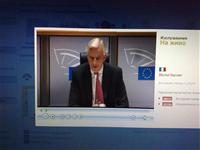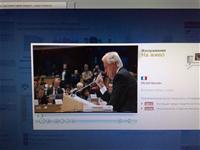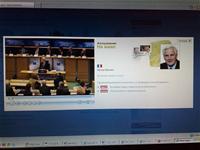Michel Barnier will work for financial regulation and for the SMEs
euinside, January 15, 2010
 The French Michel Barnier is the nominee for a Commissioner on the Internal Market and the Services - a position, taken so far by the Irish Charlie McCreevy. The first priority of Mr. Barnier would be the development of support tools for citizens and enterprises, especially against the background of the exit from the financial and economic crisis. This would mean the corresponding market-operation studies to be held to identify areas in which the internal market is not delivering its full potential and presenting new initiatives to stimulate growth in the interest of citizens and SMEs, the French Commissioner-designate writes in his written replies to the parliamentary Committee for the Internal Market and Consumers Protection.
The French Michel Barnier is the nominee for a Commissioner on the Internal Market and the Services - a position, taken so far by the Irish Charlie McCreevy. The first priority of Mr. Barnier would be the development of support tools for citizens and enterprises, especially against the background of the exit from the financial and economic crisis. This would mean the corresponding market-operation studies to be held to identify areas in which the internal market is not delivering its full potential and presenting new initiatives to stimulate growth in the interest of citizens and SMEs, the French Commissioner-designate writes in his written replies to the parliamentary Committee for the Internal Market and Consumers Protection.
An interesting details is that the chairman of the Committee is Malcolm Harbour who took part in the hearing of the first Bulgarian Commissioner-designate more than 3 years ago Meglena Kuneva.
The second priority of Michel Barnier would be the creation of a dynamic European financial sector which is regulated in an intelligent manner and monitored efficiently. For the purpose the French candidate has identified 5 objectives for equipping our financial system with a more solid and more equitable foundation: a financial sector at the service of sustainable growth; a more equitable sector, with consumers, savers and SMEs protected appropriately; a more disciplined sector, with  better supervision of financial institutions and greater coordination at European level; preparation of mechanisms which will enable us to deal with crises and, the fifth, creating an environment that would make the EU a key player globally, mostly in formats like the G20 and other international institutions.
better supervision of financial institutions and greater coordination at European level; preparation of mechanisms which will enable us to deal with crises and, the fifth, creating an environment that would make the EU a key player globally, mostly in formats like the G20 and other international institutions.
Very interesting is the third priority of Michel Barnier - development of knowledge-based economy. This is a priority, set many times on a European level but so far not much has been done, except the creation of the European Institute for Innovation and Technology. To achieve this goal Mr. Barnier intends to organise a thorough reform the European intellectual property system.
![]() 17:12 The experience French politician was also not spared some inconvenient questions about his past - the MEPs wanted to know whether they could rely on him as a Commissioner who had openly stated his political partialities to as a gaullist and also his statements that he was closer to some member states than others. Barnier assured that he would never let his political beliefs go because he was in politics since 14-15 year old and his idols were general Charles de Gaulle and the German chancellor Konrad Adenauer for whom the Frenchman added that he kept a portrait of the German in his office and carried it with him everywhere.
17:12 The experience French politician was also not spared some inconvenient questions about his past - the MEPs wanted to know whether they could rely on him as a Commissioner who had openly stated his political partialities to as a gaullist and also his statements that he was closer to some member states than others. Barnier assured that he would never let his political beliefs go because he was in politics since 14-15 year old and his idols were general Charles de Gaulle and the German chancellor Konrad Adenauer for whom the Frenchman added that he kept a portrait of the German in his office and carried it with him everywhere.
 As a former Commissioner he was deeply convinced in the European idea politician, Michel Barnier assured the MEPs that his political partialities would not hamper his work as a supranational and supraparty European Commissioner.
As a former Commissioner he was deeply convinced in the European idea politician, Michel Barnier assured the MEPs that his political partialities would not hamper his work as a supranational and supraparty European Commissioner.
Further on the MEPs again wanted reassurances that Barnier, nominated after many bilateral negotiations between Germany and France and then between France and Britain, would not be subordinate to the London City or the French authorities. "If you want I will swear to you, and you know that I will have to make an oath in the Court if I am approved for Commissioner. I have done this couple of times and you can check that in every 5 years I have strictly kept this oath and have protected the common European interest. This is a matter of honour for any commissioner. This is even more important in this acute financial crisis. So, please do not worry, I will choose a good team and will do everything I can. Do not worry, I will not take orders neither from Paris, nor from London", Mr. Barnier assured.
He was throughly interrogated about specific fields of EU's internal market like the concessioning of water and other public services. The French candidate said he would consider this proposal very deeply because at the moment there was no directive that explicitly dealt with concessions. He added that during his previous term in the Commission of Romano Prodi he had discussed the issue in the College of Commissioners of creation of a single European legislation but there was no consensus. According to him, attention must be paid on the specifics, traditions and peculiarities of concessioning in member states.
The MEPs also wanted to understand whether and when the candidate would propose a directive  for the public services. Barnier again did not reply concretely, explaining to his former colleagues (he as a member of the Committee) that he was not very well prepared but if he would become a Commissioner he would study very carefully what the opportunities were. According to him it was very important to take into account the specifics of the separate public services like healthcare and the pension system, for example. The French candidate recalled that the European had said long ago that they wanted more Europe in this regard but often the national interest came forward.
for the public services. Barnier again did not reply concretely, explaining to his former colleagues (he as a member of the Committee) that he was not very well prepared but if he would become a Commissioner he would study very carefully what the opportunities were. According to him it was very important to take into account the specifics of the separate public services like healthcare and the pension system, for example. The French candidate recalled that the European had said long ago that they wanted more Europe in this regard but often the national interest came forward.
There was a very serious discussion regarding the measures for protection against counterfeit of European goods. Michel Barnier said that the producer of such goods must be known. Because of counterfeiting of European goods 2.5 mn people had lost their jobs. He stated he supported loyal competition but health and the interests of consumers should be protected. His idea for preventing this was by concluding, together with his colleagues designates Karel de Gucht and Antonio Tajani, of the counterfeit agreement with the US within the WTO.